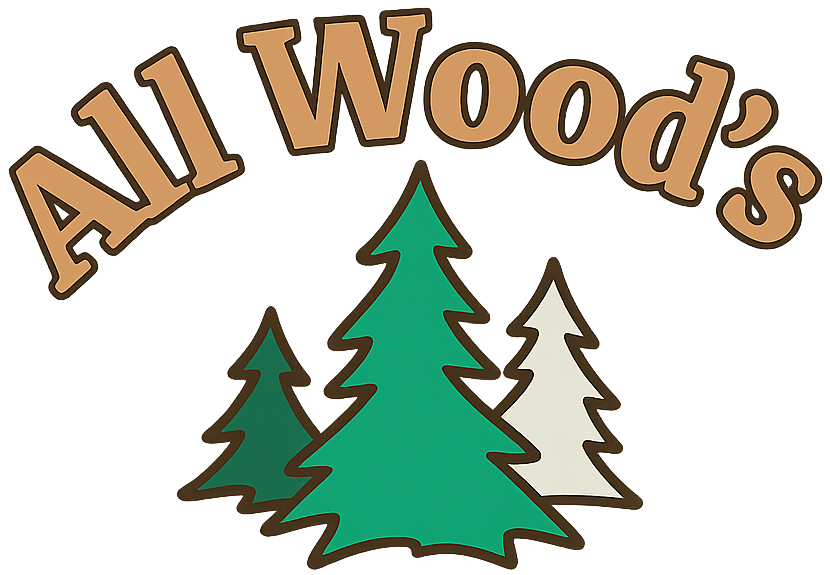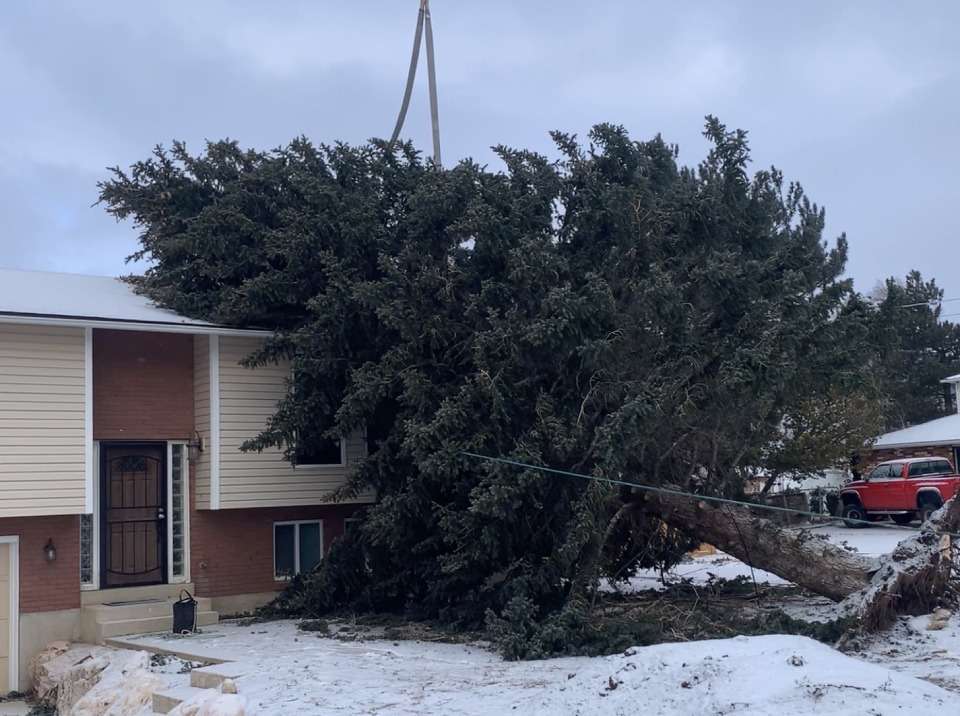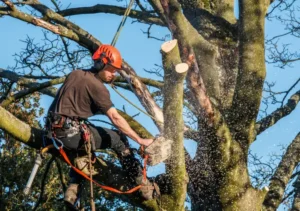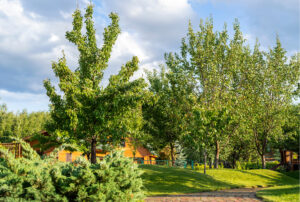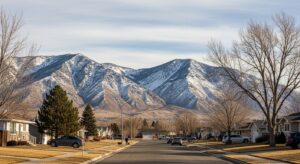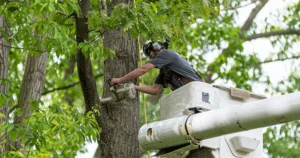
When natural disasters strike, trees are often among the first casualties. Strong winds, lightning strikes, and severe storms can cause even the sturdiest trees to fall, potentially damaging property. This type of damage is often referred to as “Act of God” tree damage. Understanding what this means, who is responsible, and how to protect your property can save you from unexpected costs and liability issues. Here’s what homeowners need to know about Act of God tree damage and how All Wood’s Tree Service can help.
What Is “Act of God” Tree Damage?
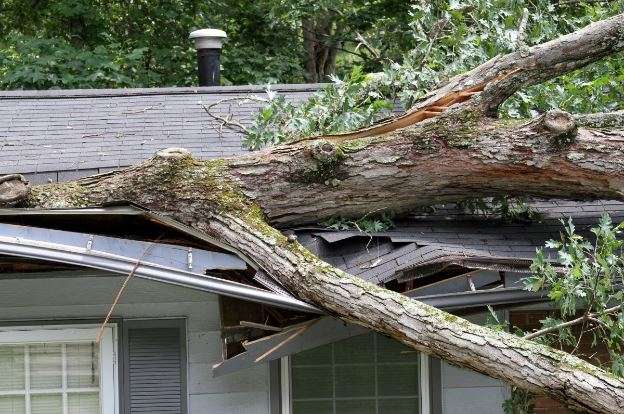
The term “Act of God” refers to natural events that are beyond human control, such as hurricanes, earthquakes, floods, or lightning strikes. When a tree falls due to one of these events, the damage it causes may be classified as an Act of God. Insurance companies often use this term to determine liability for property damage, meaning it wasn’t due to human negligence.
Who Is Responsible for Act of God Tree Damage?
When a tree falls due to an Act of God, the question of responsibility can become tricky. In many cases, homeowners are responsible for the damage caused by trees located on their property, even if the damage extends to neighboring properties. However, if a tree falls due to a storm or other natural event, insurance companies may cover the damage under the “Act of God” clause in the policy.
Key Statistics for 2025
• Approximately 72% of U.S. homeowners insurance policies now provide coverage for tree damage caused by Act of God events.
Carriers have expanded wind and storm-related loss coverage due to rising extreme weather claims between 2021 and 2024.
• The United States experienced an estimated 25 billion-dollar weather and climate disasters in 2024, according to early NOAA reporting—surpassing previous records and increasing the likelihood of Act of God tree damage events in 2025.
This includes severe windstorms, atmospheric river events, and high-impact snowstorms affecting Western states like Utah.
• Wind, microburst, and storm-related losses continue to dominate insurance activity, now accounting for roughly 38–42% of all homeowners insurance claims nationally as of 2025.
Falling trees, broken limbs, and storm-related yard damage are among the most common reasons for these claims.
• Utah saw an increase in localized windstorm activity from 2022–2024, with gusts exceeding 70–90 mph in multiple counties—conditions strongly associated with Act of God tree failures.
This trend is expected to continue into 2025 based on regional climate modeling.
• Snow-load failures remain a top winter hazard in Northern Utah. Several Wasatch Front communities recorded snowpack levels 120–150% above average during the 2023–2024 season, contributing to higher rates of winter tree damage.
The Act of God Defense
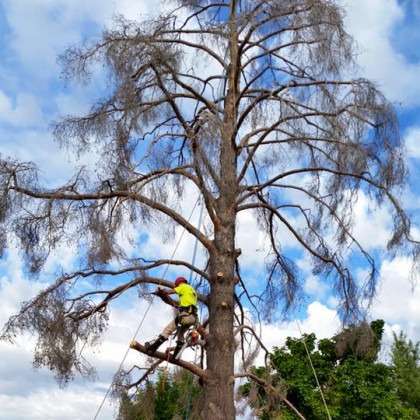
Homeowners may use the “Act of God” defense to avoid liability if a tree from their property damages a neighbor’s property during a natural event. If the tree was healthy and well-maintained before the event, you may not be held liable, as the situation was out of your control.
However, if a tree was dead, diseased, or you were aware that it posed a danger, you could be held liable for neglect, even during an Act of God event. This is why regular tree inspections and maintenance are crucial to reduce potential liability.
How to Protect Yourself and Your Property
Here are some steps homeowners can take to minimize the risk of Act of God tree damage:
- Regular Inspections: Have a professional inspect your trees regularly to identify any weak or damaged limbs that could pose a hazard.
- Tree Trimming: Keep trees trimmed and maintained to reduce the likelihood of falling branches during a storm.
- Monitor Tree Health: Diseased or dying trees are more likely to fall during a natural event. Promptly remove any trees that are unhealthy or unstable.
- Review Your Insurance Policy: Ensure your homeowners’ insurance covers tree-related damage, especially for natural disasters common in your area.
How All Wood’s Tree Service Can Help
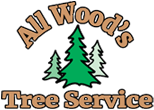
At All Wood’s Tree Service, we specialize in maintaining the health and safety of your trees to protect your property from potential hazards. Whether you need routine inspections, tree trimming, or emergency removal after a storm, our experienced team is here to help. We also provide guidance on managing tree risks to reduce your liability in Act of God situations.
Contact Us Today If a tree on your property has been damaged by a storm or if you’re concerned about the health of your trees, contact All Wood’s Tree Service for expert assistance. Call us at 801-476-9181 or visit our website to schedule an inspection. Let us help you keep your property safe and your trees healthy!
By taking the right precautions and partnering with a trusted tree care service, you can protect your home from the unexpected and minimize the impact of natural events on your trees.
Frequently Asked Questions About Act of God Tree Damage
Does homeowners insurance cover Act of God tree damage?
In many cases, yes. Most standard homeowners insurance policies cover Act of God tree damage when the fallen tree causes damage to a structure on your property, such as your home, garage, shed, fence, or vehicle. However, if the tree falls without damaging insured property, or if the tree was already dead/diseased, coverage may vary. Always check your policy language or speak with your insurance provider for confirmation.
If my neighbor’s tree falls on my property, is it still considered Act of God tree damage?
Yes—if a storm or other natural event caused the failure. In Act of God tree damage cases, Utah homeowners are typically responsible for filing a claim with their own insurance company, even if the tree originated on a neighbor’s property. However, if there is evidence that the neighbor neglected a hazardous tree (such as ignoring visible disease, decay, or leaning), liability may shift.
How can I prove the damage was caused by an Act of God for insurance purposes?
Insurers often look for specific indicators such as storm reports, photos of the damage, tree condition prior to failure, and evidence of natural forces (wind gust readings, lightning strikes, snow accumulation). Having a professional tree assessment from a qualified arborist—like All Woods Tree Service—can provide documentation that supports your claim.
Does Act of God tree damage apply if the tree was already weakened or unhealthy?
Not usually. Insurance companies distinguish between sudden, unpredictable events and preventable hazards. If a tree was known to be diseased, dying, or structurally compromised before the incident, insurers may argue that proper maintenance could have prevented the failure. In these situations, the damage may not qualify as Act of God tree damage.
What should I do immediately after Act of God tree damage occurs?
Take these steps:
-
Document the scene with photos and videos.
-
Avoid approaching damaged or hanging limbs.
-
Contact your insurance provider to start the claim process.
-
Call a licensed tree service to safely assess the tree and remove hazards.
All Woods Tree Service provides emergency response for storm-damaged trees throughout Northern Utah.
Can I prevent Act of God tree damage?
While no one can stop severe weather, preventative tree care significantly reduces risk. Regular pruning, hazard assessments, root-zone health improvements, and removal of compromised trees help trees withstand storms more effectively. All Woods Tree Service offers proactive tree care options to minimize future Act of God tree damage on your property.
